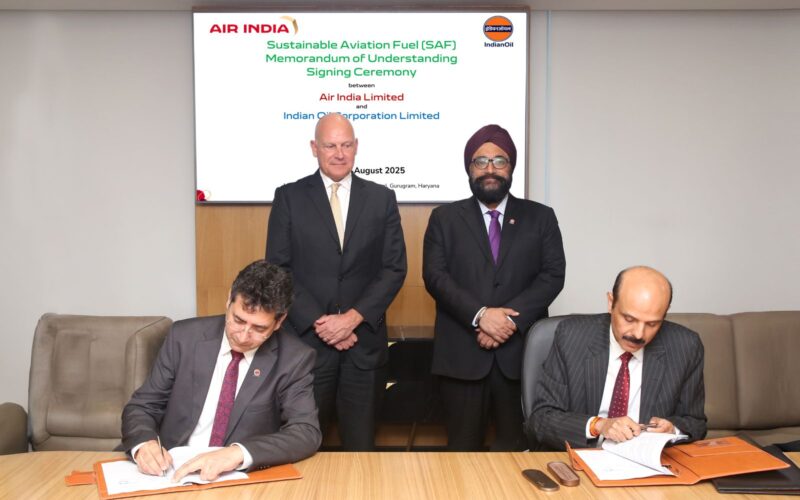#AirIndia #IndianOil #SustainableAviationFuel #GreenAviation #SAF #NetZero2050 #CORSIA #Decarbonisation #CleanEnergy #AviationNews
Chandigarh – In a landmark development for India’s aviation and energy sectors, Air India and Indian Oil Corporation Limited (IOCL) today signed a Memorandum of Understanding (MoU) for the supply of Sustainable Aviation Fuel (SAF). The agreement marks a significant step in the transition towards low-carbon aviation and reinforces India’s commitment to sustainable growth in line with global climate goals.
A Strategic Collaboration for Green Aviation
The MoU outlines a framework under which Air India, a Tata Group company, will procure Sustainable Aviation Fuel from IndianOil. This partnership not only supports the airline’s IATA Net Zero by 2050 commitment but also aligns with India’s national ambition to blend 5% SAF by 2030.
With this collaboration, Air India has become the first Indian airline to formally tie up with a domestic fuel supplier for SAF at scale, signalling a pivotal shift in the sector’s green transition.
The agreement was signed by Shailesh Dhar, Executive Director (Aviation), IndianOil and P Balaji, Group Head – GRC and Corporate Affairs, Air India, in the presence of AS Sahney, Chairman, IndianOil, and Campbell Wilson, CEO & Managing Director, Air India, along with senior officials from both organisations.
Leadership Speaks
Speaking on the occasion, AS Sahney, Chairman, IndianOil, said:
“The signing of this MoU with Air India represents a strategic step in India’s transition to sustainable aviation. With our ISCC-CORSIA-certified SAF from Panipat, IndianOil is ready to provide a sustainable fuel solution that will help decarbonize air travel. Partnering with India’s flagship carrier, we are aligning national growth with global climate goals and setting a benchmark for the industry.”
Campbell Wilson, CEO & MD, Air India, added:
“Through this MoU with IndianOil, Air India is committed to support the Government of India’s initiatives to promote sustainable development in the aviation sector and to further its own sustainability goals to achieve the IATA Net Zero by 2050 target.”
Supporting Air India’s Green Transition
The partnership comes at a time when Air India is undergoing a historic transformation. With 570 new aircraft on order, the airline is poised to operate one of the lowest carbon-emitting fleets in the world. The integration of SAF into its operations will complement this fleet renewal, helping to significantly lower lifecycle emissions.
Air India is also adopting a wide range of measures to improve fuel efficiency and reduce emissions, including:
-
Flight optimisation systems for better route planning and air traffic coordination.
-
Use of lighter materials in catering and cabin operations.
-
Single-engine taxiing and autonomous EV towing to reduce ground fuel burn.
-
Regular engine and airframe washes to improve fuel efficiency.
-
Collaborations with CSIR and Indian Institute of Petroleum on SAF research and deployment.
Together, these steps form part of Air India’s roadmap to meet both its corporate sustainability goals and India’s commitments under global aviation agreements.
IndianOil’s SAF Milestone
For IndianOil, this collaboration builds on its recent achievement of becoming the first Indian company to receive ISCC CORSIA certification for SAF production at its Panipat Refinery. The certification, granted under ICAO’s Carbon Offsetting and Reduction Scheme for International Aviation (CORSIA), demonstrates IndianOil’s ability to produce SAF that meets stringent international sustainability and lifecycle emission standards.
By producing certified green fuels domestically, IndianOil is playing a pivotal role in building India’s SAF supply chain, reducing reliance on imports, and supporting airlines in achieving their decarbonisation targets.
Why This Matters for India and Global Aviation
The aviation industry accounts for nearly 2–3% of global CO₂ emissions, and its share is projected to rise as air travel demand increases. SAF is widely recognised as one of the most effective near-term solutions to decarbonise aviation, capable of reducing lifecycle emissions by up to 80% compared to conventional jet fuel.
For India, the adoption of SAF not only supports climate commitments but also creates opportunities to develop a domestic biofuel economy, generate employment in feedstock supply chains, and position the country as a leader in sustainable aviation.
With Air India and IndianOil leading the way, this partnership sets an industry precedent, encouraging other carriers and fuel suppliers in India to accelerate SAF adoption.
Road Ahead
Through this MoU, Air India and IndianOil will collaborate on developing a framework for scaling up SAF supply, ensuring that future international flights can meet CORSIA obligations with reliable and transparent fuel sourcing.
The partnership also opens the door to pilot projects and blended fuel usage on select domestic and international routes, potentially making Air India one of the first Indian carriers to operate long-haul flights with SAF blends.
As global airlines race to decarbonise, this initiative puts India firmly on the map of sustainable aviation pioneers. By combining Air India’s expanding international footprint with IndianOil’s certified SAF production capabilities, the collaboration underscores how national carriers and domestic energy giants can jointly drive climate action.
Conclusion
The MoU between Air India and IndianOil represents more than just a commercial agreement – it is a statement of intent for India’s aviation future. By integrating Sustainable Aviation Fuel into mainstream operations, the two organisations are not only working towards global climate goals but also redefining the country’s role in the transition to green aviation.
Hashtags:
#AirIndia #IndianOil #SustainableAviationFuel #GreenAviation #SAF #NetZero2050 #CORSIA #Decarbonisation #CleanEnergy #AviationNews

